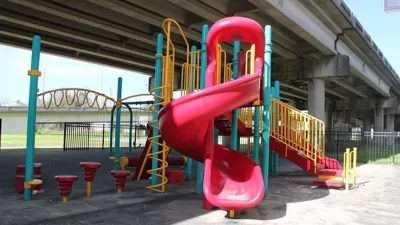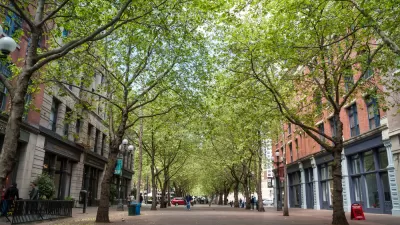Despite the well-documented impacts of traffic noise and pollution, Vancouver's housing policy effectively relegates multi-family apartment buildings to busy arterial roads.

"Instead of planning for housing options in locations that maximize the health and well-being of residents, policymakers are mandating that people who prefer more compact, energy-efficient, and lower-cost homes can only live on traffic-choked arterial streets—and must suffer all the bad health consequences," writes Daniel Oleksiuk of Vancouver's housing policy that recommends the construction of new multi-family apartment buildings on arterial roads as a "buffer" for noise and pollution. Yet research increasingly shows the detrimental impacts of exposure to traffic pollution, such as respiratory disease, cancer, and mental health impacts.
"This November, Vancouver City Council will vote on the Secured Rental Policy, a proposal to legalize six-story rental apartments on busy arterial roads and four-story rentals on the adjacent side streets." According to Oleksiuk, "[u]nless the draft Secured Rental Policy is amended to open up more of the city to multi-dwelling homes, Vancouver’s official position will remain clear: renters are fodder for protecting those fortunate enough to own detached houses on big lots."
Although some families might prefer to live on arterial streets close to public transit, Oleksiuk argues that "[t]he issue at play is one of choice: arterial streets should not be the only places where families living on lower incomes should be able to afford." With most Vancouver renters priced out of the single-family and condo markets, apartment dwellers are unfairly exposed "to the increased health risks that come from living on busy, arterial roads."
FULL STORY: CONFINING RENTAL HOMES TO BUSY STREETS IS A DEVIL’S BARGAIN

Planetizen Federal Action Tracker
A weekly monitor of how Trump’s orders and actions are impacting planners and planning in America.

Map: Where Senate Republicans Want to Sell Your Public Lands
For public land advocates, the Senate Republicans’ proposal to sell millions of acres of public land in the West is “the biggest fight of their careers.”

Restaurant Patios Were a Pandemic Win — Why Were They so Hard to Keep?
Social distancing requirements and changes in travel patterns prompted cities to pilot new uses for street and sidewalk space. Then it got complicated.

Albuquerque Route 66 Motels Become Affordable Housing
A $4 million city fund is incentivizing developers to breathe new life into derelict midcentury motels.

DC Area County Eliminates Bus Fares
Montgomery County joins a growing trend of making transit free.

Platform Pilsner: Vancouver Transit Agency Releases... a Beer?
TransLink will receive a portion of every sale of the four-pack.
Urban Design for Planners 1: Software Tools
This six-course series explores essential urban design concepts using open source software and equips planners with the tools they need to participate fully in the urban design process.
Planning for Universal Design
Learn the tools for implementing Universal Design in planning regulations.
Heyer Gruel & Associates PA
JM Goldson LLC
Custer County Colorado
City of Camden Redevelopment Agency
City of Astoria
Transportation Research & Education Center (TREC) at Portland State University
Camden Redevelopment Agency
City of Claremont
Municipality of Princeton (NJ)





























